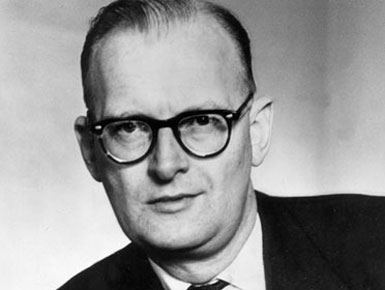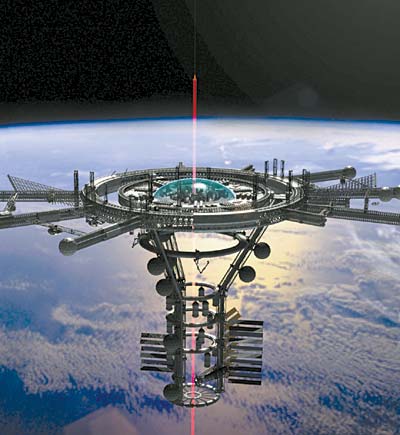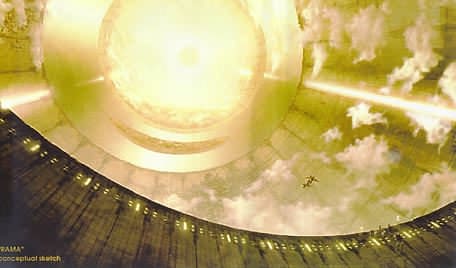Beyond the Limits of the Possible: A Farewell to Sir Arthur C. Clarke
“The only way of discovering the limits of the possible is to venture a little way past them into the impossible,” notes the second of Sir Arthur C. Clarke’s laws. Every grand master of science-fiction since Asimov has three laws, and this second law of Clarke’s feels, to me, like one of the three main laws of science-fiction and speculation.
 | | Sir Arthur C. Clarke 1917-2008 |
Last Wednesday, Clarke died at the age of 90 in Sri Lanka. Though he was a dauntless athiest and secularist, his greatest contribution to science-fiction was his ability to capture wonder at the grand beauty and machinations of the universe around us. Whether his story deals with an exploration of the cosmos, a speculation about the evolution of man, or the influences of an extremely advanced alien society, he always manages to evoke the wide-eyed sense of enchantment, reverence, respect, and marvel that underlies his own fascination with science.
He is the second writer who has had a defining influence on my own creativity, and though I did not know him, I owe him a debt that is impossible to repay. It began in high school when, as a final research project in my English class, I was able to pick his 2001: A Space Odyssey as the subject. I knew who Clarke was by then, but unless you count the readings of 2010: Odyssey Two my friend John used to give when he’d babysit, I had never actually read any of his work. At the time, I picked his name off of a list simply because it wasn’t Jane Austen, Herman Melville, or any other of the hundred or so tired relics of literature that I was told to love but secretly despised.
Reading 2001: A Space Odyssey changed my life, forcing me to read more of Clarke’s work, including Childhood’s End, The Songs of Distant Earth, The Hammer of God, Imperial Earth, The Fountains of Paradise, and of course Rendezous with Rama (which is the finest example of what a science-fiction novel should be). Though I could never hope to match Clarke’s knowledge of science, his grasp of the future, or his mastery of hard science-fiction, I have always tried to capture a bit of his sense of awe in my own work.
 | | The Space Elevator: the key to easy, cheap, and manageable space travel for all |
Clarke’s first law states, “When a distinguished but elderly scientist states that something is possible, he is almost certainly right. When he states that something is impossible, he is very probably wrong.” As a distinguished speculative scientist, Clarke is credited with envisioning the communications satellite, among other things, and his concept of the space elevator (a concept he stuck by in his elderly years) probably holds the key to the future of space travel, if only somebody out there would have the vision and financial backing to actually build one. He strove for a level of accuracy in his prophetic conjectures about the future that is hard for anyone to match, and anyone who has read his work knows that he doesn’t gloss over the technological details and difficulties the way most science-fiction writers—myself included—do.
For instance, when faced with communications between distant points in space, the average science-fiction writer will name an unexplained technology that allows for instantaneous communication, which solves the problem and allows the writer to continue his story unabated (the “Star Trek Gambit”). Clarke, however, as he did in more than one book, will demonstrate how such communication would have to actually work, with all of the inevitable time-lag and complication. Not only does he do this to honor truth, but he manages to use it as a means for creating dramatic tension. In many cases, an entire Clarke story can be built with technological limitations as the primary obstacles for the protagonist to overcome, and though the stories are about much more than technology, the narrative is clearly defined by it. Rendezvous with Rama is a good example.
But the thing people remember the most about Arthur C. Clarke’s writing is best demonstrated by his oft-quoted third law: “Any sufficiently advanced technology is indistinguishable from magic.”
 | | Rama is awesome, so please contact David Fincher and Morgan Freeman and beg them to make the damn movie already (gamers should know that Rama inspired Halo) |
Throughout mankind’s curious lifespan, people have been fascinated by the magical, mystical, and unexplainable. Science, a relatively young sport for philosophers, has demonstrated that there are immutable laws behind such things, a logical mathematic language that doesn’t require high priests to decipher. Even Einstein believed that, at its core, the universe had to be simple enough for anyone to understand, but that its simplicity could spawn anything the imagination could conjure.
This is where Sir Arthur C. Clarke came in, using fantastic elements like alien technologies and accelerated human evolution. He was able to realistically fill in the gap between a simple universe and the magical inventions of his imagination, and in so doing, he created a vision that is poignant without being preachy, beautiful without being air-brushed, and shocking without being impossible.
Though his death is a depressing blow, his legacy will be with us for generations to come. If you haven’t read any of his work, you should. I recommend starting with Childhood’s End, 2001: A Space Odyssey, or Rendezvous with Rama. If you know me personally, I’d be happy to let you borrow one of my copies.
-e. magill 03/24/2008
|
|